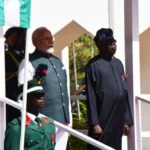The Attorney-General of the Federation and Minister of Justice, Abubakar Malami, has faulted the invitation of President Muhammadu Buhari by the Federal House of Representatives saying the National Assembly has no “constitutional power” to summon the president.
According to Malami, the lack extends to power “to envisage or contemplate a situation” where the president would be summoned by the legislature on operational use of the Armed Forces.
- After Daily Trust story, FG suspends sale, activation of SIM cards
- 5 die as scavengers attack one another with cutlass in Abuja
In his interpretation of the relevant portions of the constitution, he said privileges attached to the Office of the President—exclusivity and confidentiality in security operations—remain sacrosanct.
Malami’s response follows a recent move by the legislature to invite the President on account of growing insecurity and the use of the armed forces.
The House of Representatives Speaker, Femi Gbajabiamila had previously confirmed that the President had agreed to appear.
But the justice minister and attorney-general said, “The right of the President to engage the National Assembly and appear before it is inherently discretionary in the President and not at the behest of the National Assembly.
“The management and control of the security sector is exclusively vested in the President by Section 218 (1) of the Constitution as the Commander in Chief of the Armed Forces including the power to determine the operational use of the Armed Forces. An invitation that seeks to put the operational use of the Armed Forces to a public interrogation is indeed taking the constitutional rights of law making beyond bounds.
“As the Commander in Chief, the President has exclusivity on security and has confidentiality over security.
“These powers and rights he does not share. So, by summoning the President on National Security operational Matters, the House of Representative operated outside constitutional bounds. President’s exclusivity of constitutional confidentiality investiture within the context of the constitution remains sacrosanct.

 Join Daily Trust WhatsApp Community For Quick Access To News and Happenings Around You.
Join Daily Trust WhatsApp Community For Quick Access To News and Happenings Around You.

